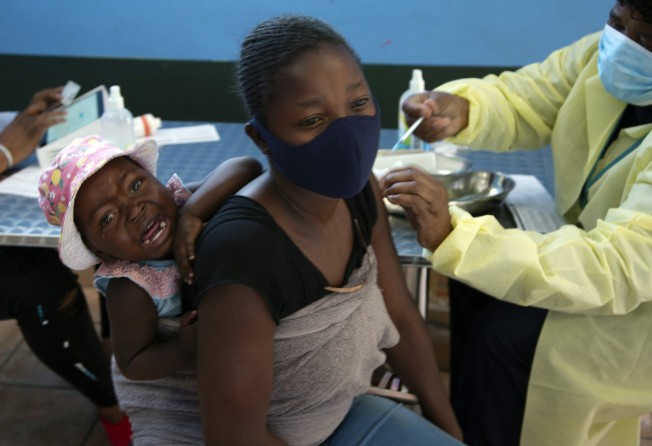South Africa detects new coronavirus variant with many mutations, prompting UK travel ban
- The B.1.1.529 strain has at least 10 mutations, compared to two for Delta or three for Beta
- The variant has also been detected in Botswana and Hong Kong among travellers from the country

Scientists in South Africa said on Thursday they had detected a new Covid-19 variant with a large number of mutations, blaming it for a surge in infection numbers.
The number of daily infections in Africa’s hardest-hit country has increased tenfold since the start of the month.
“Unfortunately we have detected a new variant which is a reason for concern in South Africa,” virologist Tulio de Oliveira told a hastily called news conference.
The variant, which goes by the scientific lineage number B.1.1.529, “has a very high number of mutations,” he said, expressing hope that the World Health Organization would give it a Greek name on Friday.
“It’s unfortunately causing a resurgence of infections,” he said.
The variant has also been detected in Botswana and Hong Kong among travellers from South Africa, he added.
Amid concern over the new strain, Britain on Thursday said it would ban travel from six southern African countries.
“The early indication we have of this variant is it may be more transmissible than the Delta variant and the vaccines that we currently have may be less effective against it,” Health Secretary Sajid Javid said, adding that the variant had not been found so far in Britain.
But he said British scientists were “deeply concerned” and as a precaution a decision had been to suspend all flights from South Africa, Namibia, Lesotho, eSwatini, Zimbabwe and Botswana from noon on Friday.
The foreign ministry said Britain’s decision to ban flights from South Africa “seems to have been rushed”.
“Our immediate concern is the damage that this decision will cause to both the tourism industries and businesses of both countries,” Foreign Minister Naledi Pandor said in a statement, adding South Africa would engage with British authorities to try to get them to reconsider their decision.
The WHO said it is “closely monitoring” the reported variant and is expected to convene a technical meeting on Friday to determine if it should be designated a variant of “interest” or of “concern”.
“Early analysis shows that this variant has a large number of mutations that require and will undergo further study,” the WHO added.
South African Health Minister Joe Phaahla said the variant was of “serious concern” and behind an “exponential” increase in reported cases, making it “a major threat”.
The country’s daily number of infections hit 1,200 on Wednesday, up from 106 earlier in the month.

Before the detection of the new variant, authorities had predicted a fourth wave to hit South Africa starting around the middle of December, buoyed by travel ahead of the festive season.
The government-run National Institute for Communicable Diseases (NICD) said 22 positive cases of the B.1.1.529 variant have been recorded in the country following genomic sequencing.
The NICD said the number of detected cases and the percentage testing positive are “increasing quickly” in three of the country’s provinces including Gauteng, home to the economic Johannesburg and the capital Pretoria.
A cluster outbreak was recently identified, concentrated at a higher education institute in Pretoria, the NICD added.
Last year South Africa also detected the Beta variant of the virus, although until now its infection numbers have been driven by the Delta variant, which was originally detected in India.
The country has the highest pandemic numbers in Africa with around 2.95 million cases, of which 89,657 have been fatal.
Scientists said the new B.1.1.529 variant has at least 10 mutations, compared to two for Delta or three for Beta.
“What gives us some concerns (is) that this variant might not just have enhanced transmissibility, so spreads more efficiently, but might also be able to get around parts of the immune system and the protection we have in our immune system,” said researcher Richard Lessells.
The coming days and weeks will be key to determine the severity of the variant, Lessells said.
Neutralising the variant is “complicated by the number of mutations this variant” contains, said one of the scientists Penny Moore.
“This variant contains many mutations that we are not familiar with,” she added.
The Africa Centres for Disease Control and Prevention (Africa CDC) said it will soon meet South African experts to discuss the variant.
“There are so many variants out there but some of them are of no consequence on the trajectory of the epidemic,” Africa CDC head John Nkengasong told a news conference on Thursday.
After a rather slow start to South Africa’s vaccination campaign, around 41 per cent of adults have received at least a single dose, while 35 per cent are fully vaccinated. Those numbers are far above the continental average of 6.6 per cent vaccinated.
It is aiming to inoculate 70 per cent of its 59 million people.
With stockpiles of 16.5 million shots, South Africa has deferred taking delivery of more ordered doses because “we are getting vaccines in faster than we are using” them, health ministry director Nicholas Crisp said.